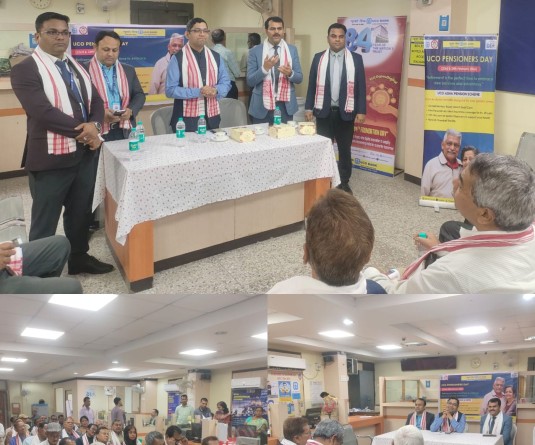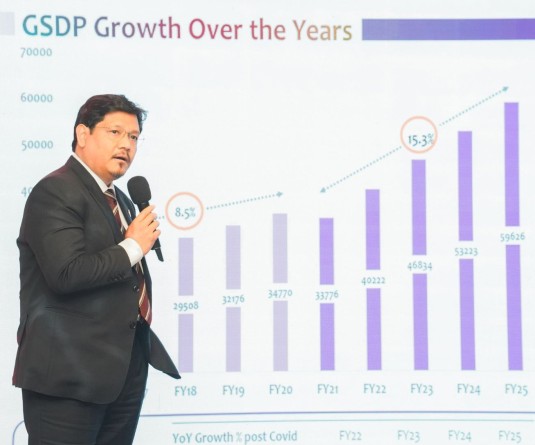
Guwahati | March 10 : They ruled Assam for 600 years before the British took over in 1830s. They have been reigning after 1947 too, heading both democratically elected and underground governments.
That has not prevented the Ahoms, the community Assam chief minister Tarun Gogoi and United Liberation Front of Asom (Ulfa) chairman Arabinda Rajkhowa belong to, from linking mandate 2011 to their demand for scheduled tribe (ST) status. Ditto with ethnic cousins Mataks, the community elusive Ulfa commander-in-chief Paresh Barua is a member of. The Ahoms and Mataks are among seven ethnic groups seeking ST status. The others are Morans, Koch-Rajbongshis, Chutiyas, Karbi (Plains) and ‘Tea Tribe’.
The 6 million Koch-Rajbongshis were a ruling community too, and their fight for ST status is dovetailed with the creation of Kamtapur state straddling Assam and West Bengal. “The political parties promise us ST status before the elections only to forget. We won’t rest until we get what we deserve,” said All Koch-Rajbongshi Students’ Union president Biswajit Ray.
Opinions divided behind the demand rationale
Many in Assam don’t see the logic behind the ST status demand of some 4 million Ahoms. They dominate the resources-rich districts of eastern Assam, are wealthier and politically more potent than most.
Ahom student leader Moyur Borgohain disagreed. “We should be incorporated in the list of ST (Plains),” he said, indicating the constitutional safeguard was necessary against illegal Bangladeshi migrants.
The ‘Tea Tribe’ – many refer to them as the ‘politically correct’ Adivasis – has perhaps been the most vocal and violent in their demand for ST status though the others think they “aren’t in the same boat”.
Indigenous communities feel the ‘Tea Tribe’ doesn’t qualify to be categorized as ST as they are so listed in central India, their places of origin. Comprising 87 groups such as Santhals, Kols, Bhils, Mundas and Oraons, they were conscripted by British tea planters as labourers. Their association with the tea industry gave them a ‘tribal’ identity.
Today, they number more than 7 million and hold the key to at least 25 (of maximum 126 seats) across Assam’s tea growing areas. “Be it the Congress, BJP or Asom Gana Parishad, all parties depend on us to be in power. How long can they ignore our demand for ST status,” said Adivasi leader Justin Lakra.
The Registrar General of India had in 2007 rejected the idea of granting ST status to tea plantation labourers as they “did not qualify” to be in that category. The Ministry of Home Affairs had also pointed out that some of the communities comprising ‘Tea Tribe’ were not STs in their native states.
That has not prevented the Ahoms, the community Assam chief minister Tarun Gogoi and United Liberation Front of Asom (Ulfa) chairman Arabinda Rajkhowa belong to, from linking mandate 2011 to their demand for scheduled tribe (ST) status. Ditto with ethnic cousins Mataks, the community elusive Ulfa commander-in-chief Paresh Barua is a member of. The Ahoms and Mataks are among seven ethnic groups seeking ST status. The others are Morans, Koch-Rajbongshis, Chutiyas, Karbi (Plains) and ‘Tea Tribe’.
The 6 million Koch-Rajbongshis were a ruling community too, and their fight for ST status is dovetailed with the creation of Kamtapur state straddling Assam and West Bengal. “The political parties promise us ST status before the elections only to forget. We won’t rest until we get what we deserve,” said All Koch-Rajbongshi Students’ Union president Biswajit Ray.
Opinions divided behind the demand rationale
Many in Assam don’t see the logic behind the ST status demand of some 4 million Ahoms. They dominate the resources-rich districts of eastern Assam, are wealthier and politically more potent than most.
Ahom student leader Moyur Borgohain disagreed. “We should be incorporated in the list of ST (Plains),” he said, indicating the constitutional safeguard was necessary against illegal Bangladeshi migrants.
The ‘Tea Tribe’ – many refer to them as the ‘politically correct’ Adivasis – has perhaps been the most vocal and violent in their demand for ST status though the others think they “aren’t in the same boat”.
Indigenous communities feel the ‘Tea Tribe’ doesn’t qualify to be categorized as ST as they are so listed in central India, their places of origin. Comprising 87 groups such as Santhals, Kols, Bhils, Mundas and Oraons, they were conscripted by British tea planters as labourers. Their association with the tea industry gave them a ‘tribal’ identity.
Today, they number more than 7 million and hold the key to at least 25 (of maximum 126 seats) across Assam’s tea growing areas. “Be it the Congress, BJP or Asom Gana Parishad, all parties depend on us to be in power. How long can they ignore our demand for ST status,” said Adivasi leader Justin Lakra.
The Registrar General of India had in 2007 rejected the idea of granting ST status to tea plantation labourers as they “did not qualify” to be in that category. The Ministry of Home Affairs had also pointed out that some of the communities comprising ‘Tea Tribe’ were not STs in their native states.


.jpg)



